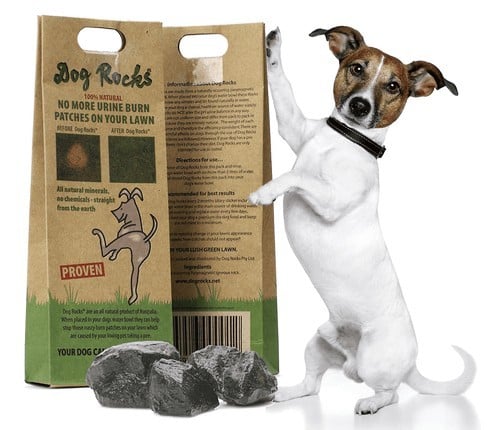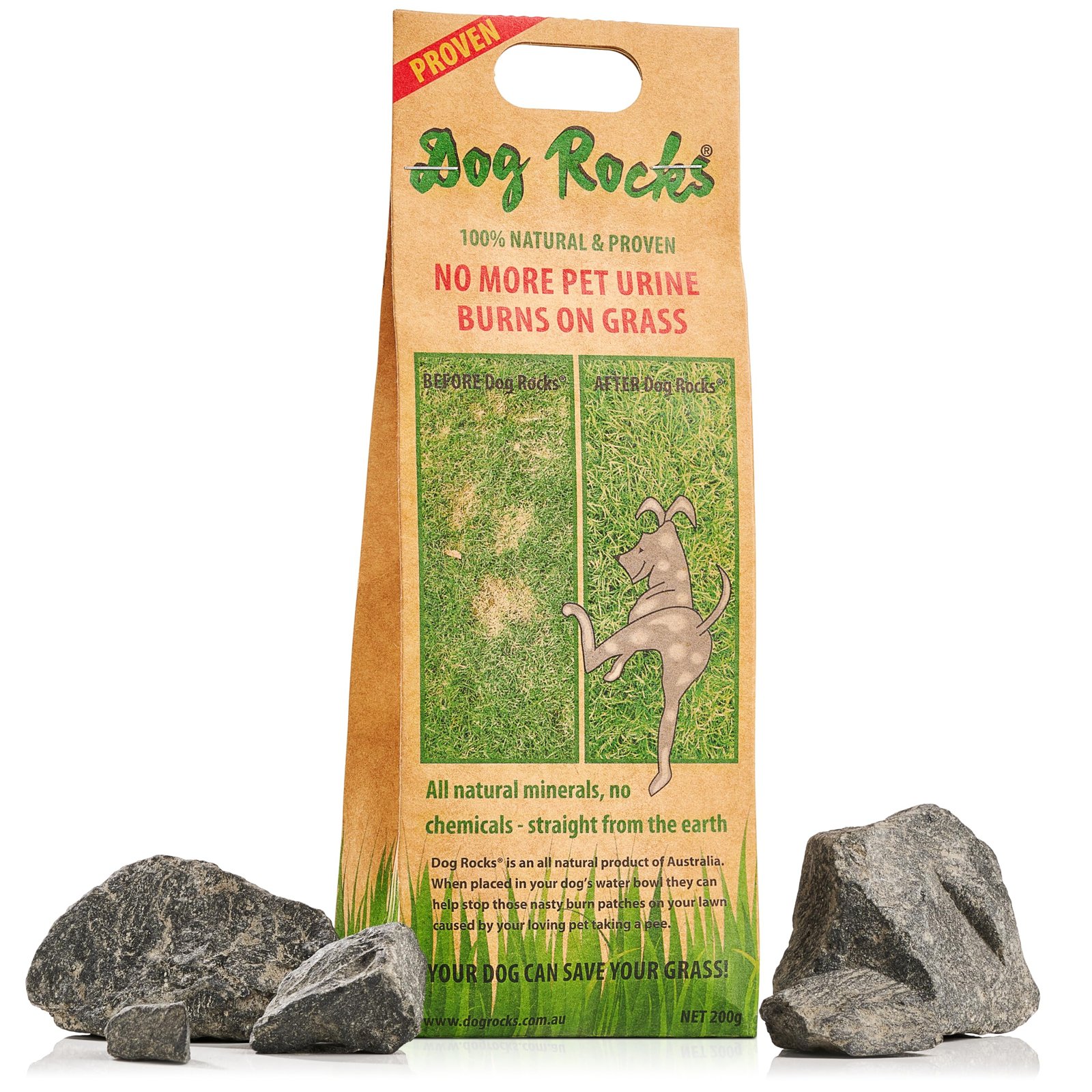Dog Rocks are popular among pet owners. Many believe they help reduce yellow spots on lawns caused by dog urine. So let’s read: What Do Vets Think of Dog Rocks?
But what do veterinarians really think about them? Understanding the opinions of vets on Dog Rocks can guide pet owners in making informed choices. Some believe these rocks can help, while others raise concerns about their effectiveness. Vets often focus on a dog’s health and the implications of using such products.
They consider the ingredients and how they may affect a pet’s diet. This blog will explore what veterinarians say about Dog Rocks, their benefits, and potential drawbacks. This will help you decide whether they are a good option for your furry friend.

Credit: www.gardenmyths.com
Table of Contents
Introduction To Dog Rocks
Dog Rocks are a popular product among dog owners. Many people use them to help reduce lawn burn caused by dog urine. But what do veterinarians really think about Dog Rocks? Understanding their purpose and how they work can help pet owners make informed choices.
The Purpose Of Dog Rocks
Dog Rocks aim to protect your lawn. They are designed to prevent yellow spots caused by dog urine. Here are some key points:
- Dog Rocks are natural volcanic rocks.
- They filter water as dogs drink.
- They help reduce nitrogen levels in urine.
This natural method appeals to many pet owners. It offers a way to keep lawns healthy while caring for pets.
How Dog Rocks Claim To Work
Dog Rocks claim to work through a simple process. They claim to absorb impurities in water. This leads to a change in the dog’s urine. Here’s how it works:
- Place the rocks in your dog’s water bowl.
- Allow the rocks to filter the water.
- Let your dog drink the treated water.
The makers say this reduces nitrogen levels. Lower nitrogen means less lawn burn. However, opinions vary among veterinarians.
Vets On Lawn Care And Pet Health
Pet owners care deeply about their furry friends. They also want beautiful lawns. The challenge is finding the right balance. Vets have valuable insights on this topic. They know how lawn care can affect pet health.
Balancing Aesthetics With Pet Safety
Many pet owners want a green, lush lawn. Vets suggest that safety must come first. Here are some tips for balancing lawn beauty with pet health:
- Choose pet-safe fertilizers.
- Use organic pest control methods.
- Avoid harmful chemicals.
- Limit the use of herbicides.
It is essential to check product labels. Look for signs that indicate pet safety. Some products may claim to be safe but contain harmful ingredients.
Common Concerns With Lawn Treatments
Vets share common concerns about lawn treatments. Here are the main issues:
| Concern | Description |
|---|---|
| Chemical Exposure | Pets may ingest chemicals while playing outside. |
| Skin Irritation | Chemicals can cause rashes or other skin issues. |
| Long-Term Effects | Some treatments may harm pets over time. |
Pet owners should consult their vets. Discuss which lawn care methods are safest. This helps protect pets while maintaining a nice yard.
Choosing the right lawn care products is crucial. Safety should always come first. Healthy pets and beautiful lawns can coexist.
The Science Behind Dog Rocks
Understanding the science behind Dog Rocks can help pet owners make informed choices. These rocks claim to reduce urine burn on lawns caused by dogs. But what do vets think? Let’s dive into the key components and their effects.
Key Ingredients And Their Effects
Dog Rocks are made from a specific type of mineral. Here are the key ingredients:
- Zeolite: A natural mineral that absorbs impurities.
- Silica: Helps with moisture retention.
- Calcium: Supports dog health.
These ingredients work together to filter out harmful substances in water. The idea is simple. Dogs drink cleaner water. This leads to healthier urine. Less harmful waste means less lawn damage.
| Ingredient | Effect |
|---|---|
| Zeolite | Absorbs impurities |
| Silica | Retains moisture |
| Calcium | Supports health |
Assessing The Efficacy Through Studies
Research on Dog Rocks is limited but insightful. Some studies indicate positive effects. Others raise questions about their effectiveness.
- Study 1: Showed reduced lawn damage in controlled settings.
- Study 2: Found no significant differences in urine composition.
Vets often emphasize the importance of a balanced diet. Proper nutrition can also reduce urine damage. While Dog Rocks may help, they are not a sole solution.
Pet owners should monitor their dog’s health. Always consult with a vet for tailored advice. Understanding all factors helps in making the best choices for your dog.

Credit: www.gardenmyths.com
Vets’ Perspectives On Dog Rocks
Veterinarians have varying opinions about Dog Rocks. Some see potential benefits. Others express concerns. Understanding these views can help dog owners make informed choices.
Potential Benefits Highlighted By Professionals
Some vets point out possible advantages of using Dog Rocks. They mention:
- Reduction of Urine Burn: Dog Rocks may help reduce grass burn caused by dog urine.
- Natural Ingredient: Made from natural volcanic rock, they are chemical-free.
- Easy to Use: Simply place them in your dog’s water bowl.
Some studies suggest they may benefit lawn health. However, more research is needed for solid conclusions.
Criticisms And Warnings From Veterinary Experts
Many veterinarians raise concerns about Dog Rocks. Common criticisms include:
- Lack of Scientific Evidence: Studies backing their effectiveness are limited.
- Nutritional Concerns: They may not provide essential nutrients for dogs.
- False Sense of Security: Owners might neglect proper lawn care.
Veterinary experts often recommend focusing on diet and hydration. Healthy dogs lead to healthier lawns.
| Aspect | Vets’ Support | Vets’ Concerns |
|---|---|---|
| Urine Burn | May reduce damage | Limited evidence |
| Ingredients | Natural product | No nutritional value |
| Usage | Simple to use | Can lead to neglect |
Consider these insights from vets. They can guide decisions about using Dog Rocks.
Safety Considerations For Dogs
Dog Rocks are popular among pet owners. They claim to reduce yellow spots on lawns. But what do vets think about their safety? Here, we explore the safety aspects. We discuss possible side effects and long-term effects of using Dog Rocks.
Possible Side Effects
Some dogs may experience side effects from Dog Rocks. These are important to know before use. Here are common side effects:
- Stomach upset
- Diarrhea
- Decreased appetite
Each dog is different. Not all dogs will have these issues. Always monitor your dog after introducing any new product.
Long-term Implications Of Using Dog Rocks
Long-term use of Dog Rocks raises questions. Vets have some concerns about prolonged exposure. Here are key points to consider:
- Mineral build-up in the body
- Impact on kidney function
- Possible nutrient imbalances
Consult with a vet for a personalized opinion. They can help determine what’s best for your dog.
Keep your dog’s health a priority. Assess any changes in behavior or health. Always seek professional advice if unsure.
Comparing Alternatives To Dog Rocks
Dog Rocks are popular for protecting lawns from dog urine. Many pet owners seek alternatives. Some products and methods may work just as well. Let’s explore these options.
Natural Lawn Protection Strategies
Using natural methods can be effective and safe for your lawn. Here are some strategies:
- Watering the lawn: Regular watering helps dilute urine.
- Train your dog: Encourage bathroom breaks in specific areas.
- Healthy diet: A balanced diet can reduce urine acidity.
- Grass types: Choose resilient grass that withstands dog urine.
These strategies are easy to implement. They also promote a healthy lawn without chemicals.
Other Products And Solutions
Many products claim to protect your lawn. Here are some popular options:
| Product | Type | Effectiveness |
|---|---|---|
| Dog Rocks | Mineral stones | Moderate |
| Dog Urine Neutralizer | Spray | High |
| Grass Patch | Artificial | Very High |
| Enzyme Cleaners | Liquid | High |
Read reviews before choosing any product. Each option has different benefits and costs. Consider your lawn’s needs and your dog’s behavior.
Explore these alternatives. They may suit your needs better than Dog Rocks.
Real-world Experiences With Dog Rocks
Many dog owners wonder about the effectiveness of Dog Rocks. These natural stones claim to prevent brown patches on lawns caused by dog urine. Vets provide valuable insights and share real-world experiences. Let’s explore their views through case studies and testimonials.
Case Studies From Vet Practices
Vets across different practices have observed various outcomes with Dog Rocks. Here are some notable case studies:
| Vet Practice | Location | Results |
|---|---|---|
| Happy Paws Vet Clinic | New York | Noticed reduced lawn discoloration. |
| Green Field Animal Hospital | California | Owners reported significant improvement. |
| Pet Care Associates | Texas | Mixed results; some lawns improved. |
Vets recommend Dog Rocks for some pet owners. Results vary based on lawn type and dog diet. It’s not a guaranteed solution for everyone.
Testimonials From Dog Owners
Dog owners have shared their experiences with Dog Rocks. Here are some common themes:
- Improved Lawn Health: Many owners see greener grass.
- Less Worry: Owners feel relieved about urine damage.
- Mixed Experiences: Some noticed little to no change.
Here are a few direct quotes from dog owners:
- “My lawn looks so much better since using Dog Rocks!”
- “I didn’t see much difference, but my dog loves them.”
- “Great for my peace of mind, even if results vary.”
Dog Rocks may help some lawns thrive. Owners appreciate the effort to maintain a beautiful yard. Experience can differ based on many factors.
Final Thoughts From Veterinary Professionals
Veterinary professionals have varying opinions on Dog Rocks. Some vets support their use. Others express concerns about their effectiveness. Understanding these views helps dog owners make informed choices.
Best Practices For Dog Owners
Dog owners should follow some best practices when considering Dog Rocks:
- Consult your vet before use.
- Monitor your dog’s health regularly.
- Ensure your dog drinks plenty of water.
- Keep a balanced diet for your pet.
- Observe any changes in your lawn.
The Verdict On Dog Rocks
Vets often provide mixed feedback on Dog Rocks:
| Veterinary Opinion | Comments |
|---|---|
| Supportive | Some vets believe they can help reduce lawn stains. |
| Neutral | Others find no clear scientific evidence. |
| Concerned | Some worry about potential health risks. |
Always consider your dog’s health. Talk with your vet before using Dog Rocks.

Credit: www.amazon.com
Frequently Asked Questions
What Are Dog Rocks Used For?
Dog Rocks are natural mineral stones that help prevent brown patches on lawns caused by dog urine. They work by filtering out harmful nitrates from your dog’s urine. Many pet owners use them to maintain a healthier lawn while providing an eco-friendly solution for their pets.
Do Vets Recommend Dog Rocks?
Many vets express mixed opinions about Dog Rocks. Some believe they can help reduce lawn damage, while others are skeptical of their effectiveness. It’s essential to consult your veterinarian for personalized advice based on your dog’s health and habits.
How Do Dog Rocks Work?
Dog Rocks work by absorbing harmful nitrates in your dog’s urine. When your dog ingests the rocks, they help modify the urine’s composition. This process can reduce the likelihood of lawn damage, making it a popular choice for pet owners looking for a solution.
Are Dog Rocks Safe For Dogs?
Yes, Dog Rocks are generally considered safe for dogs. They are made from natural minerals and pose no significant health risks. However, it’s crucial to monitor your dog’s behavior and consult a vet if you notice any adverse reactions.
Conclusion
Many vets have mixed feelings about Dog Rocks. Some believe they help reduce lawn stains. Others think the science behind them is not strong enough. Pet owners should weigh the pros and cons. Always consult your vet before trying new products.
Your dog’s health comes first. Remember, every pet is unique. What works for one may not work for another. Stay informed and make the best choice for your furry friend.



